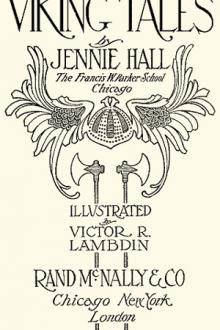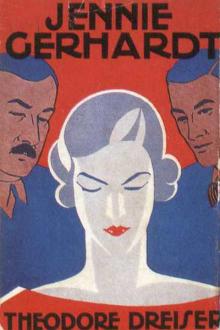Viking Tales by Jennie Hall (books to read now txt) 📕

- Author: Jennie Hall
- Performer: -
Book online «Viking Tales by Jennie Hall (books to read now txt) 📕». Author Jennie Hall
The Project Gutenberg EBook of Viking Tales, by Jennie Hall
This eBook is for the use of anyone anywhere at no cost and with
almost no restrictions whatsoever. You may copy it, give it away or
re-use it under the terms of the Project Gutenberg License included
with this eBook or online at www.gutenberg.org
Title: Viking Tales
Author: Jennie Hall
Illustrator: Victor R. Lambdin
Release Date: March 12, 2008 [EBook #24811]
Language: English
*** START OF THIS PROJECT GUTENBERG EBOOK VIKING TALES ***
Produced by Bryan Ness, Stephen Blundell and the Online
Distributed Proofreading Team at http://www.pgdp.net (This
file was produced from images generously made available
by The Internet Archive/American Libraries.)
VIKING TALES
Copyright, 1902,
By Jennie Hall
Made in U.S.A.
Minor typographical errors have been corrected without note. In the Pronouncing Index the up tack diacritical mark over a vowel is represented by [+a], [+e], [+i] and [+o].
IN NORWAY The Baby 15 The Tooth Thrall 19 Olaf's Farm 27 Olaf's Fight with Havard 40 Foes'-fear 47 Harald is King 53 Harald's Battle 62 Gyda's Saucy Message 71 The Sea Fight 81 King Harald's Wedding 89 King Harald Goes West-Over-Seas 95 Part II.
WEST-OVER-SEAS Homes in Iceland 103 Eric the Red 143 Leif and His New Land 161 Wineland the Good 174 Descriptive Notes 194 Suggestions to Teachers 200 A Reading List 204 A Pronouncing Index 207
Iceland is a little country far north in the cold sea. Men found it and went there to live more than a thousand years ago. During the warm season they used to fish and make fish-oil and hunt sea-birds and gather feathers and tend their sheep and make hay. But the winters were long and dark and cold. Men and women and children stayed in the house and carded and spun and wove and knit. A whole family sat for hours around the fire in the middle of the room. That fire gave the only light. Shadows flitted in the dark corners. Smoke curled along the high beams in the ceiling. The children sat on the dirt floor close by the fire. The grown people were on a long narrow bench that they had pulled up to the light and warmth. Everybody's hands were busy with wool. The work left their minds free to think and their lips to talk. What was there to talk about? The summer's fishing, the killing of a fox, a voyage to Norway. But the people grew tired of this little gossip. Fathers looked at their children and thought:
"They are not learning much. What will make them brave and wise? What will teach them to love their country and old Norway? Will not the stories of battles, of brave deeds, of mighty men, do this?"
So, as the family worked in the red fire-light, the father told of the kings of Norway, of long voyages to strange lands, of good fights. And in farmhouses all through Iceland these old tales were told over and over until everybody knew them and loved them. Some men could sing and play the harp. This made the stories all the more interesting. People called such men "skalds," and they called their songs "sagas."
Every midsummer there was a great meeting. Men from all over Iceland came to it and made laws. During the day there were rest times, when no business was going on. Then some skald would take his harp and walk to a large stone or a knoll and stand on it and begin a song of some brave deed of an old Norse hero. At the first sound of the harp and the voice, men came running from all directions, crying out:
"The skald! The skald! A saga!"
They stood about for hours and listened. They shouted applause. When the skald was tired, some other man would come up from the crowd and sing or tell a story. As the skald stepped down from his high position, some rich man would rush up to him and say:
"Come and spend next winter at my house. Our ears are thirsty for song."
So the best skalds traveled much and visited many people. Their songs made them welcome everywhere. They were always honored with good seats at a feast. They were given many rich gifts. Even the King of Norway would sometimes send across the water to Iceland, saying to some famous skald:
"Come and visit me. You shall not go away empty-handed. Men say that the sweetest songs are in Iceland. I wish to hear them."
These tales were not written. Few men wrote or read in those days. Skalds learned songs from hearing them sung. At last people began to write more easily. Then they said:
"These stories are very precious. We must write them down to save them from being forgotten."
After that many men in Iceland spent their winters in writing books. They wrote on sheepskin; vellum, we call it. Many of these old vellum books have been saved for hundreds of years, and are now in museums in Norway. Some leaves are lost, some are torn, all are yellow and crumpled. But they are precious. They tell us all that we know about that olden time. There are the very words that the men of Iceland wrote so long ago—stories of kings and of battles and of ship-sailing. Some of those old stories I have told in this book.
PART IKing Halfdan lived in Norway long ago. One morning his queen said to him:
"I had a strange dream last night. I thought that I stood in the grass before my bower.[1] I pulled a thorn from my dress. As I held it in my fingers, it grew into a tall tree. The trunk was thick and red as blood, but the lower limbs were fair and green, and the highest ones were white. I thought that the branches of this great tree spread so far that they covered all Norway and even more."
"A strange dream," said King Halfdan. "Dreams are the messengers of the gods. I wonder what they would tell us," and he stroked his beard in thought.
Some time after that a serving-woman came into the feast hall where King Halfdan was. She carried a little white bundle in her arms.
"My lord," she said, "a little son is just born to you."
"Ha!" cried the king, and he jumped up from the high seat and hastened forward until he stood before the woman.
"Show him to me!" he shouted, and there was joy in his voice.
The serving-woman put down her bundle on the ground and turned back the cloth. There was a little naked baby. The king looked at it carefully.
"It is a goodly youngster," he said, and smiled. "Bring Ivar and Thorstein."[2]
They were captains of the king's soldiers. Soon they came.
"Stand as witnesses," Halfdan said.
Then he lifted the baby in his arms, while the old serving-woman brought a silver bowl of water. The king dipped his hand into it and sprinkled the baby, saying:
"I own this baby for my son. He shall be called Harald. My naming gift to him is ten pounds of gold."
Then the woman carried the baby back to the queen's room.
"My lord owns him for his son," she said. "And no wonder! He is perfect in every limb."
The queen looked at him and smiled and remembered her dream and thought:
"That great tree! Can it be this little baby of mine?"
[1] See note about house on page 194.
[2] See note about names on page 194.
When Harald was seven months old he cut his first tooth. Then his father said:
"All the young of my herds, lambs and calves and colts, that have been born since this baby was born I this day give to him. I also give to him this thrall, Olaf. These are my tooth-gifts to my son."
The boy grew fast, for as soon as he could walk about he was out of doors most of the time. He ran in the woods and climbed the hills and waded in the creek. He was much with his tooth thrall, for the king had said to Olaf:
"Be ever at his call."
Now this Olaf was full of stories, and Harald liked to hear them.
"Come out to Aegir's Rock, Olaf, and tell me stories," he said almost every day.
So they started off across the hills. The man wore a long, loose coat of white wool, belted at the waist with a strap. He had on coarse shoes and leather leggings. Around his neck was an iron collar welded together so that it could not come off. On it were strange marks, called runes, that said:
"Olaf, thrall of Halfdan."
But Harald's clothes were gay. A cape of gray velvet hung from his shoulders. It was fastened over his breast with great gold buckles. When it waved in the wind, a scarlet lining flashed out,





Comments (0)